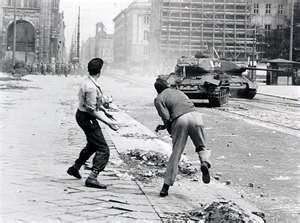
To The Last Man
A nation with massive, crushing unemployment, fortunes and life savings disappeared, crowds of desperate citizens protesting in the streets, all while the richer, stronger neighbors stand back, arms crossed, heads wagging. Greece these last few years? No, Germany in the early 1920’s.
Yes, Germany. After they lost the First World War in 1918, the Germans were forced to sign a peace treaty that obligated them, amongst other things, to pay massive war reparations to the countries that had beaten them. Already weakened by the disruptions of the war itself, these onerous post-war financial obligations sent the German economy into a death spiral. The value of the Reichsmark sank so precipitously that something that cost a hundred marks one day could easily cost a thousand by the next. It could cost ten thousand. There was no work. People were desperate. Unemployed and embittered veterans roamed the streets. The Germans bitterly resented what they saw as unfair suffering imposed upon them by the victor nations.
After struggling to pay, and after years of hyperinflation and economic depression, in 1934 Germany did finally default on this war debt. Adolf Hitler did that and it was a wildly popular move at the time. The Germans felt themselves finally free of the economic shackles they’d been dragging around since 1919.
And, well, we all know what happened after that, the Nazis, the camps, another war lost. Billions of dollars poured into a new country called West Germany to repair the result of starting a war in other people’s countries and having it finish up in your own. But even the Marshall Plan wasn’t perfect and in 1953 West Germany’s foreign debt was officially written down again.
Okay, 1919 was a long time ago, so was 1934. Even 1953 might be stretching it a little, but the Germans pride themselves on their knowledge of history, their own as well as others.
For example, they certainly know what happened at a small mountain pass in 480 BC at a place called Thermopylae. It was in Thermopylae where a tiny force of Greek soldiers died to the last man holding off a numerically superior force of Persians. Their sacrifice, which has gone into the history books, and been immortalized in story, song, and film, won no war, but bought the city of Athens on the plain below enough time to evacuate. It was important to the Greeks to save Athens, for Athens in 480 BC was a great city-state, a democracy, albeit an imperfect one, but a democracy, the first one, the one that inspired all the other ones: in England, in France, in Germany, in the USA.
Summer 2015. Do the Greeks really have to die to the last man again? Do they really have to commit financial suicide to defend an increasingly abstract ideal of European economic purity? It’s one thing to get a handful of men to die for an ideal. It’s a lot more difficult to get a whole country to do it. Especially if it’s not necessarily their ideal. And the Greeks don’t want to do it. It’s hard to blame them.
Now, don’t get me wrong. The Greeks have been profligate with their money. They haven’t managed their finances well, but the Europeans have known this for years. They knew it when they let Greece into the single currency in 2000, they knew it when I lived in Germany back in the 1980’s and the Greek beaches were teeming with Northern Europeans soaking up the sun on their cheap summer vacations.
The European Union says that it’s tired of paying for Greece’s economic mistakes, but is it really prepared to drive Greece to the wall? For Greece’s problems are Europe’s problems, whether she’s in or out of the single currency. Greece is Europe. She was Europe in the beginning, some would say she was the beginning of Europe, of the modern, enlightened, prosperous Europe that we so admire and that refugees from all over the world are presently killing themselves to get into.
Why can’t they just forgive some of the debt? Why not? Why did they lend them so much in the first place?
The lenders say they don’t want to take that hit, and I guess I can understand that, but they will take a hit if Greece tumbles into free fall. They will take a hit when, because Brussels wouldn’t compromise for Greece, the next ailing country gets sent to the wall as well. And so, thread by thread, does Europe unravel, or the dream of Europe that Europeans have been dreaming for more than a thousand years.
I was in Greece in the summer of 1986 with a German boy, living cheap, sleeping on beaches, hiking in the mountains. I remember one day when a group of us struggled to the top of a very steep slope. At the top of the slope, we came out into the orchard of a small, white-washed Greek farmhouse. The farmer, who was in his orchard as we struggled over the crest of the hill, instead of shooing us off his land, took one look at our exhausted, sweat-streaked faces, picked four large pears from one of his trees, and brought them to us with the only word he knew in English, “Hello.”
I still remember that farmer, and the pear I ate warm from his hand. I still remember standing there in the Greek mountains under the hot blue sky, and I still remember the hospitality that was so natural and simple, that was part of his nature. And I say write down the debt. Write it down! Because of a pear? That’s right, because of a pear. It’s hard to put a value on things. What’s it worth to keep Europe together? It must be worth something.





Nicely done. I like the thread that takes us back to Thermopylae, and the reminder that investors in Greek debt will be taking a haircut regardless of what happens. The little story that closes the piece is a lovely coda. I look forward to a follow-up note on Tsipras and Varoufakis — the well-meaning hacks who have, in the words of one Greek pensioner, “turned Greece into North Korea.”
We are off to Savannah to see Bob and Fran next week. Full report to follow!
Lovely piece, Linda! You have lived a very full life young lady! Is there anywhere you haven’t lived or visited?! Your piece explained the Greek problem very well and with great compassion.
Not SUCH a young lady!
Your piece is one of the very best that I have read on the Greek crisis and you deserve a Golden Apple or Pear for it.
Thank you, oh Zeus! I take that as the highest praise.